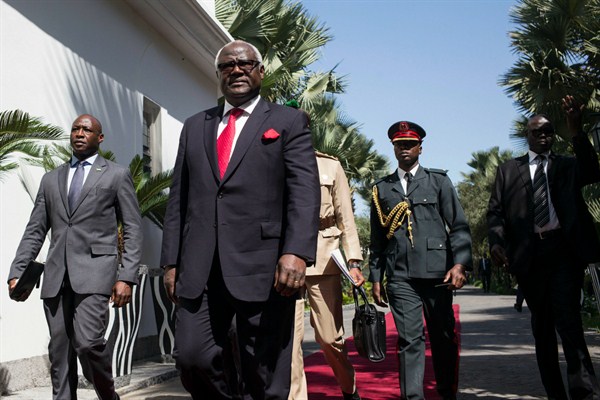On April 27, in his Independence Day address to the nation, Sierra Leone’s president, Ernest Bai Koroma, gave the clearest and most public assertion yet of his intention to leave office in March 2018. “My fellow citizens,” he declared, “in just a little over a year, my tenure will come to an end and I will graciously hand over power to my successor in a democratic transition.” Having served two terms as leader, Koroma is constitutionally ineligible to stand for a third. Despite his public remarks to the contrary, there remains a degree of skepticism in Sierra Leone that the president means what he says.
Talk of an extension to Koroma’s tenure first began in 2013, when Balogun Koroma—then the campaign coordinator of the president’s All People’s Congress party, or APC, and now the minister of transport and aviation—described the president as a “transformational leader” who deserved a third term. The issue resurfaced in October 2015, when Bai Mamoud Bangura, leader of the APC Youth League in the president’s hometown of Makeni, voiced his support for “more time” for Koroma. Bangura argued that the 18-month-long Ebola outbreak had interrupted the implementation of the president’s “Agenda for Prosperity” enough to warrant an extension to Koroma’s mandate so that he could finish what he had started.
Sierra Leone’s constitution, passed in 1991—the year its 11-year civil war began—does permit a president’s term to be extended, but only if the country is in a “state of war or emergency.” Although no formal announcement has been made, the state of emergency declared by the government in July 2014 to tackle Ebola appears to no longer be in place. Unless they are renewed, such measures lapse after one year, according to the constitution, so the opportunity to exploit this legal loophole may have expired. However, Karim Bah, the secretary-general of the Movement for Social Progress, a grassroots, pro-democracy group, notes that “the constitution was flouted when the vice president was sacked in 2015.” That suggests that the issue of extending Koroma’s term might not be an open-and-shut case for a government that has defied the constitution before.

